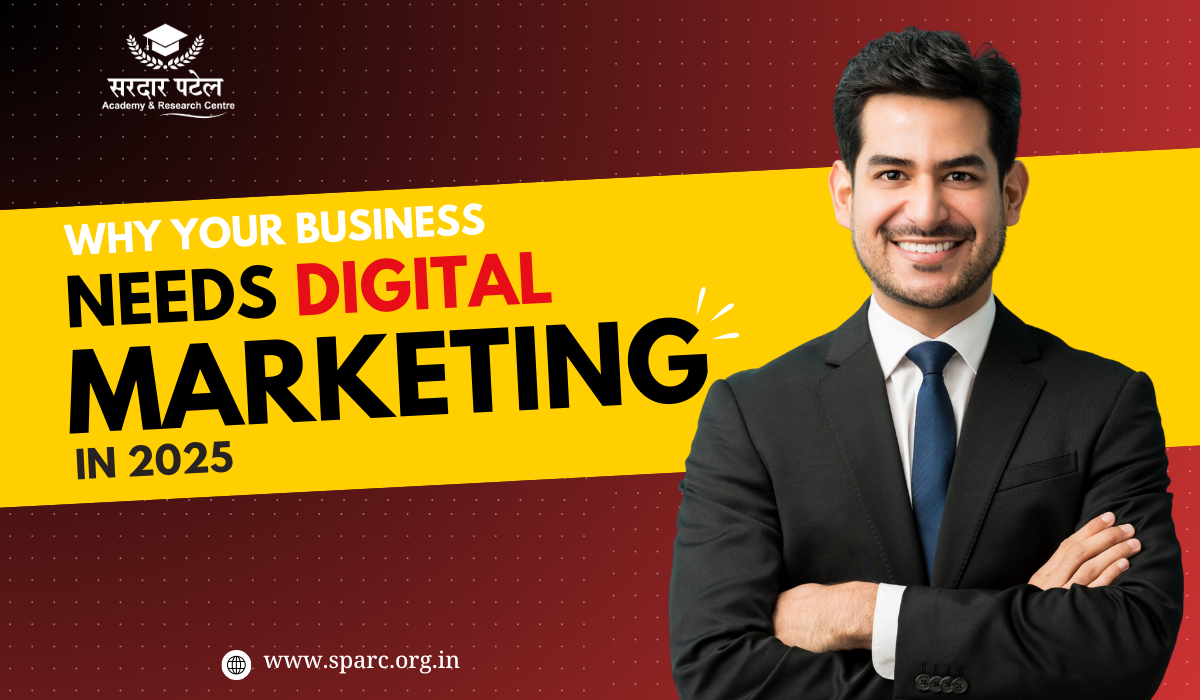
Every business is looking for online visibility and engagement in 2025. From local bakeries to consulting companies, the first point of contact for most customers is the internet. A Google search, a quick perusal of Instagram advertisements - all of these channels lead to the same destination, and that is digital marketing.
Digital marketing allows companies to create and deploy their marketing budgets wisely and effectively. All the organizations that invest in digital marketing skills are seeing a higher return on investment, more brand awareness, and more brand loyalty from customers. If you own a business or are building a business, understanding digital marketing is no longer a want; it has become a need for growth, reach, and survival in today's market.
Digital marketing refers to all marketing that is communication using any form of digital technology to promote products and services. Digital marketing encompasses the whole range of marketing efforts, from search engine visibility, social media posts, emails, paid ads, content marketing, and other digital efforts. Digital marketing has the overarching goal of:
The differences between traditional marketing and digital marketing are that you can normally reach your target customer more closely, track real-time performance, and then flexibly modify your marketing efforts based on your goals and budget.
Digital marketing encompasses a great many things, and is comprised of several key areas:
All these areas provide complementary capabilities to come together and become a cohesive digital experience.
Digital marketing helps businesses to benefit from different activities. Digital marketing technology creates visibility, competition, and connection with consumers. The specific benefits include:
Audience Reach: Digital marketing is a strong channel because it has unlimited reach in terms of places (locations and distance), time zones, and audience experiences & maturity or demographics.
Targeting Campaigns: You can define each audience based on criteria such as age, gender, location, interests, and even behaviours, which allows you to leverage every single rupee more than ever before for every campaign.
Cost-efficient: Campaigns can be made with low costs and scaled depending on the performance of the campaign, and can also be cost-effective even for smaller businesses. While costs will most likely happen with digital marketing, smaller budgets or no costs/zero budgets are common and typically enable campaigns to be scaled depending on performance.
Real-time analytics: Digital marketing campaigns allow businesses to see what is working and what is not working in real-time, which traditional marketing does not typically allow.
Two-way communication: Digital marketing mediums allow customers to engage with the brand more directly through both on-brand comments, public messages, customer reviews, and other feedback.
Brand credibility: Generally, businesses can establish trust and credibility before working with a consumer online. A positive online presence, whether in reviews, brand content, or brand engagement, will usually gain more business over a lesser-known, lesser-storied digital presence.
Many businesses that are launching digital marketing campaigns will likely utilize some combination of the digital marketing technology available for businesses. Some common digital marketing mediums include:
For SEO Technology: SEMrush, Ahrefs, Ubersuggest
For Email Marketing Technology: MailChimp, ConvertKit, SendinBlue
For Social Media: Instagram, Facebook, LinkedIn, X (Twitter)
For Analytics: Google Analytics, Meta Business Suite
For Digital Design: Canva, Figma, Adobe Illustrator,
For Digital Advertising Platforms: Google Ads, Meta Ads Manager
For Automation Platforms: Buffer, Hootsuite, Zapier.
Depending on the size of the business, budget, and unique goals, the technology and resources a business uses for its digital marketing campaign will vary.
While digital marketing is often associated with businesses that are heavily tech-oriented, or only selling products with an online e-commerce shop, the reality is that digital marketing is being used in all industries:
Whether it is retail and e-commerce, product promotions, seasonal campaigns, or abandoned cart recovery.
Whether it is healthcare and the medical field, appointment bookings, patient education, or clinic visibility.
Whether it is education and online courses, online courses promotions, webinars, or leads.
Whether hospitality: customer reviews, location-based ads, and offers.
With the growth of digital marketing, there will be job opportunities available all across the world. Here are some of the most commonly available jobs.
● Digital marketing executive - Works across SEO, ads, content, and analytics.
● SEO specialist - Works to improve the ranking and traffic of website content.
● Content writer - Writes blogs, articles, and text for promotional ads.
● Social media manager - In charge of planning and executing your social media campaigns.
● Performance marketer - works solely with paid advertising (ads, paid social) and helps with conversion tracking.
● Marketing analyst - puts interpretation to the accumulated data, finds trends, and helps with market segmentation strategies.
Many of these roles can be contract, freelance, or remote work, and salaries are based on experience, location, and years of service in the field.
Digital marketing provides businesses with a way to have control, insight, and direct access to an audience. It’s faster, more trackable, and more flexible than any traditional marketing channel available (now or in the future). If you don’t invest in digital marketing in 2025, you aren’t merely not growing quickly; you’re falling behind. Even if you’re a startup, freelancer, or established brand, this is the time to build your digital foundation and scale with purpose.
No FAQs available.